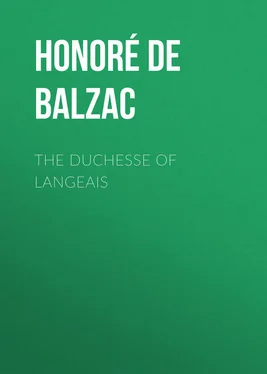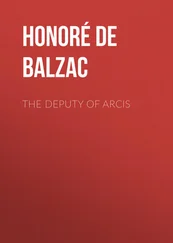Honoré Balzac - The Duchesse of Langeais
Здесь есть возможность читать онлайн «Honoré Balzac - The Duchesse of Langeais» — ознакомительный отрывок электронной книги совершенно бесплатно, а после прочтения отрывка купить полную версию. В некоторых случаях можно слушать аудио, скачать через торрент в формате fb2 и присутствует краткое содержание. Жанр: literature_19, foreign_antique, foreign_prose, на английском языке. Описание произведения, (предисловие) а так же отзывы посетителей доступны на портале библиотеки ЛибКат.
- Название:The Duchesse of Langeais
- Автор:
- Жанр:
- Год:неизвестен
- ISBN:нет данных
- Рейтинг книги:3 / 5. Голосов: 1
-
Избранное:Добавить в избранное
- Отзывы:
-
Ваша оценка:
- 60
- 1
- 2
- 3
- 4
- 5
The Duchesse of Langeais: краткое содержание, описание и аннотация
Предлагаем к чтению аннотацию, описание, краткое содержание или предисловие (зависит от того, что написал сам автор книги «The Duchesse of Langeais»). Если вы не нашли необходимую информацию о книге — напишите в комментариях, мы постараемся отыскать её.
The Duchesse of Langeais — читать онлайн ознакомительный отрывок
Ниже представлен текст книги, разбитый по страницам. Система сохранения места последней прочитанной страницы, позволяет с удобством читать онлайн бесплатно книгу «The Duchesse of Langeais», без необходимости каждый раз заново искать на чём Вы остановились. Поставьте закладку, и сможете в любой момент перейти на страницу, на которой закончили чтение.
Интервал:
Закладка:
“Oh, my brother – !”
“You do not wish to leave this tomb. You love my soul, do you say? Very well, through you it will be lost forever. I shall make away with myself – ”
“Mother!” Sister Theresa called aloud in Spanish, “I have lied to you; this man is my lover!”
The curtain fell at once. The General, in his stupor, scarcely heard the doors within as they clanged.
“Ah! she loves me still!” he cried, understanding all the sublimity of that cry of hers. “She loves me still. She must be carried off…”
The General left the island, returned to headquarters, pleaded ill-health, asked for leave of absence, and forthwith took his departure for France.
And now for the incidents which brought the two personages in this Scene into their present relation to each other.
The thing known in France as the Faubourg Saint-Germain is neither a Quarter, nor a sect, nor an institution, nor anything else that admits of a precise definition. There are great houses in the Place Royale, the Faubourg Saint-Honore, and the Chaussee d’Antin, in any one of which you may breathe the same atmosphere of Faubourg Saint-Germain. So, to begin with, the whole Faubourg is not within the Faubourg. There are men and women born far enough away from its influences who respond to them and take their place in the circle; and again there are others, born within its limits, who may yet be driven forth forever. For the last forty years the manners, and customs, and speech, in a word, the tradition of the Faubourg Saint-Germain, has been to Paris what the Court used to be in other times; it is what the Hotel Saint-Paul was to the fourteenth century; the Louvre to the fifteenth; the Palais, the Hotel Rambouillet, and the Place Royale to the sixteenth; and lastly, as Versailles was to the seventeenth and the eighteenth.
Just as the ordinary workaday Paris will always centre about some point; so, through all periods of history, the Paris of the nobles and the upper classes converges towards some particular spot. It is a periodically recurrent phenomenon which presents ample matter for reflection to those who are fain to observe or describe the various social zones; and possibly an enquiry into the causes that bring about this centralization may do more than merely justify the probability of this episode; it may be of service to serious interests which some day will be more deeply rooted in the commonwealth, unless, indeed, experience is as meaningless for political parties as it is for youth.
In every age the great nobles, and the rich who always ape the great nobles, build their houses as far as possible from crowded streets. When the Duc d’Uzes built his splendid hotel in the Rue Montmartre in the reign of Louis XIV, and set the fountain at his gates – for which beneficent action, to say nothing of his other virtues, he was held in such veneration that the whole quarter turned out in a body to follow his funeral – when the Duke, I say, chose this site for his house, he did so because that part of Paris was almost deserted in those days. But when the fortifications were pulled down, and the market gardens beyond the line of the boulevards began to fill with houses, then the d’Uzes family left their fine mansion, and in our time it was occupied by a banker. Later still, the noblesse began to find themselves out of their element among shopkeepers, left the Place Royale and the centre of Paris for good, and crossed the river to breathe freely in the Faubourg Saint-Germain, where palaces were reared already about the great hotel built by Louis XIV for the Duc de Maine – the Benjamin among his legitimated offspring. And indeed, for people accustomed to a stately life, can there be more unseemly surroundings than the bustle, the mud, the street cries, the bad smells, and narrow thoroughfares of a populous quarter? The very habits of life in a mercantile or manufacturing district are completely at variance with the lives of nobles. The shopkeeper and artisan are just going to bed when the great world is thinking of dinner; and the noisy stir of life begins among the former when the latter have gone to rest. Their day’s calculations never coincide; the one class represents the expenditure, the other the receipts. Consequently their manners and customs are diametrically opposed.
Nothing contemptuous is intended by this statement. An aristocracy is in a manner the intellect of the social system, as the middle classes and the proletariat may be said to be its organizing and working power. It naturally follows that these forces are differently situated; and of their antagonism there is bred a seeming antipathy produced by the performance of different functions, all of them, however, existing for one common end.
Such social dissonances are so inevitably the outcome of any charter of the constitution, that however much a Liberal may be disposed to complain of them, as of treason against those sublime ideas with which the ambitious plebeian is apt to cover his designs, he would none the less think it a preposterous notion that M. le Prince de Montmorency, for instance, should continue to live in the Rue Saint-Martin at the corner of the street which bears that nobleman’s name; or that M. le Duc de Fitz-James, descendant of the royal house of Scotland, should have his hotel at the angle of the Rue Marie Stuart and the Rue Montorgueil. Sint ut sunt, aut non sint , the grand words of the Jesuit, might be taken as a motto by the great in all countries. These social differences are patent in all ages; the fact is always accepted by the people; its “reasons of state” are self-evident; it is at once cause and effect, a principle and a law. The common sense of the masses never deserts them until demagogues stir them up to gain ends of their own; that common sense is based on the verities of social order; and the social order is the same everywhere, in Moscow as in London, in Geneva as in Calcutta. Given a certain number of families of unequal fortune in any given space, you will see an aristocracy forming under your eyes; there will be the patricians, the upper classes, and yet other ranks below them. Equality may be a right , but no power on earth can convert it into fact . It would be a good thing for France if this idea could be popularized. The benefits of political harmony are obvious to the least intelligent classes. Harmony is, as it were, the poetry of order, and order is a matter of vital importance to the working population. And what is order, reduced to its simplest expression, but the agreement of things among themselves – unity, in short? Architecture, music, and poetry, everything in France, and in France more than in any other country, is based upon this principle; it is written upon the very foundations of her clear accurate language, and a language must always be the most infallible index of national character. In the same way you may note that the French popular airs are those most calculated to strike the imagination, the best-modulated melodies are taken over by the people; clearness of thought, the intellectual simplicity of an idea attracts them; they like the incisive sayings that hold the greatest number of ideas. France is the one country in the world where a little phrase may bring about a great revolution. Whenever the masses have risen, it has been to bring men, affairs, and principles into agreement. No nation has a clearer conception of that idea of unity which should permeate the life of an aristocracy; possibly no other nation has so intelligent a comprehension of a political necessity; history will never find her behind the time. France has been led astray many a time, but she is deluded, woman-like, by generous ideas, by a glow of enthusiasm which at first outstrips sober reason.
So, to begin with, the most striking characteristic of the Faubourg is the splendour of its great mansions, its great gardens, and a surrounding quiet in keeping with princely revenues drawn from great estates. And what is this distance set between a class and a whole metropolis but visible and outward expression of the widely different attitude of mind which must inevitably keep them apart? The position of the head is well defined in every organism. If by any chance a nation allows its head to fall at its feet, it is pretty sure sooner or later to discover that this is a suicidal measure; and since nations have no desire to perish, they set to work at once to grow a new head. If they lack the strength for this, they perish as Rome perished, and Venice, and so many other states.
Читать дальшеИнтервал:
Закладка:
Похожие книги на «The Duchesse of Langeais»
Представляем Вашему вниманию похожие книги на «The Duchesse of Langeais» списком для выбора. Мы отобрали схожую по названию и смыслу литературу в надежде предоставить читателям больше вариантов отыскать новые, интересные, ещё непрочитанные произведения.
Обсуждение, отзывы о книге «The Duchesse of Langeais» и просто собственные мнения читателей. Оставьте ваши комментарии, напишите, что Вы думаете о произведении, его смысле или главных героях. Укажите что конкретно понравилось, а что нет, и почему Вы так считаете.












